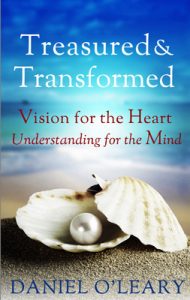Exclusive Excerpt
Treasured and Transformed
Vision for the Heart, Understanding for the Mind
While Easter, with its beautiful liturgy, is a joyous feast, that same liturgy without sacrifice is false worship. The ‘Triduum’ is rooted in human suffering, and to encounter it is to encounter Christ.
Easter is painfully recognised and experienced mainly in broken places and broken people. It is with the flawed image, the damaged beauty, that God does great things. Only what is fallen can be raised. Here are three stories from friends about meeting the Risen Christ in deep disguise.
Gerry Straub is a famous American film-maker and author. In recent years he has visited Haiti many times, and often wept at what he has seen. ‘On my desk in my library’, he recently wrote, ‘I have a mud pie I brought home from Haiti. I could never imagine being so hungry and so broke that I had to resort to eating something made from mud and contaminated water, something so vile it could make me very sick or even kill me … Mud pies are baked in ovens of anguish and hopelessness.
‘I will never forget my first visit to Cité Soleil … The devastation, the tin shacks, the rotting trash, the spewing sewage, a little girl urinating in the garbage … naked kids with bloated bellies running barefoot through pig-infested mud … And then there was the fetid and nauseating stench from rotting garbage that was intensified by the blistering heat …
‘And then, all of a sudden and totally unexpectedly, something fun and joyful caught my eye and filled me with hope. It was a makeshift kite fashioned out of a plastic garbage bag. It seemed to laugh and dance in the Caribbean breeze … It showed me how imagination could lift the human spirit out of the muck of sadness and hopelessness … And so mud pies and kites came to symbolize the death and resurrection that is a daily event in Haiti.’
Tom O’Connor, a Kiltegan Father, works in São Paulo. ‘It was Holy Saturday night’, he wrote, ‘and the crowd was unusually small. It was raining as we tried to light the paschal fire. I had no torch so it was difficult to read the prayers in Portuguese. Nothing was going right. At the high point of the Church’s liturgy, we were completely out of step with the incredible mystery we were so inadequately trying to celebrate. There was no converging of life and grace. Nothing was rhyming.
‘With more faith than finesse I began the Exultet. Suddenly there were raised voices. Oh no! Not at this vital moment. My spirits sank. Up the aisle walked a stranger with two howling children hanging on to him. I felt distracted and quite irritated. Then the small congregation turned towards them. One of the children had taken ill. For the rest of the Mass there was constant and distracting movement at the back of the church.
‘As I was quickly taking off the vestments to rush off to another church I noticed the stranger waiting for me. O God, just what I needed! More trouble and delay. Impatiently I turned to him. ‘Father,’ he said, ‘I need to talk to you. Life has changed for me since my wife, the love of my life, recently died. I am now alone, trying to bring up these two boys without her. It is so hard.
‘“Tonight we were sitting at home and the older lad said, ‘Daddy, can we go to Holy God’s house now?’ It then dawned on me that it was Holy Saturday night. I used to be a catechist. I’m so sorry about the noise. But I do want to start again. The little sick one is getting better. They are both so happy that I brought them to Holy God’s house.”
‘I was left speechless and ashamed in the presence of this man of faith. Tears welled up in my eyes. I will never forget that Holy Saturday night – the night I experienced in the depths of my being the very graces of the Easter liturgy I had just celebrated.’
Gillian Coxhead grounds grace in her experiences as a mother of four sons, as a nurse in the accident and emergency department of a children’s hospital, as a volunteer with her local L’Arche home, and in her association with a Carmelite community. She finds Easter love living at unexpected addresses in the streets of an ordinary town.
‘It is [found]’, she writes, ‘in the moment of the group of teenage boys caring for their intoxicated friend – one holding the vomit bowl, another rubbing his back; in the moment of the elderly mother caring for her alcoholic daughter; in the moment of the elderly frail husband who wakes many times every night to turn his wife as she is unable to move for herself; it is the moment of the next-door neighbour who pops in several times a day to check on a sick acquaintance, and to stay a while even though there is nothing he can really do to help.’
Three stories about the earthly reality of the heavenly life. Three raw and disturbing reflections that strip the covers from routine ceremonies, that reveal the human mess that must forever lie at the heart of real liturgy.
Theologian Karl Rahner insisted that until they are incarnated into the empty tombs of terrible nights – such as those in Haiti – into the bleeding wounds of humanity – like those touched by Thomas and Fr Tom in their doubts and even despair, into the compassionate Emmaus encounters with strangers along the risky roads of our lives, then all the paschal liturgies in the world are worthless. Liturgy without sacrifice is false worship.
The focus on the extreme pain of the Good Friday killing will forever keep before us that the Easter life is truly experienced in ‘the darkest, meanest mud and muck of things’ as the poet Emerson put it; that the Risen Life is something we painfully flesh into the routine and often shocking experiences of our precarious but ever-graced lives. This indeed is hard to take in. It threatens our comfort.
But there is no dualistic escaping the challenge of this weekend’s Triduum. There are no half measures in our following of a totally and fiercely committed Saviour. We, too, are called to incarnate in our lives the liturgy of Easter, and, like he did before us, to actually become sacrificial resurrection for others.
The poet Harindranath Chattopadhyaya was once aware of the power of his work to move, inspire and ‘win the hearts’ of his followers. He rejoiced in this fine accomplishment. One day he realised this was not enough:
But now through new-got knowledge
Which I had not had so long,
I have ceased to be the poet
And have learned to be the song.
To purchase the book by Columba Books, visit here.
To view other titles by Daniel O’Leary, visit here.




